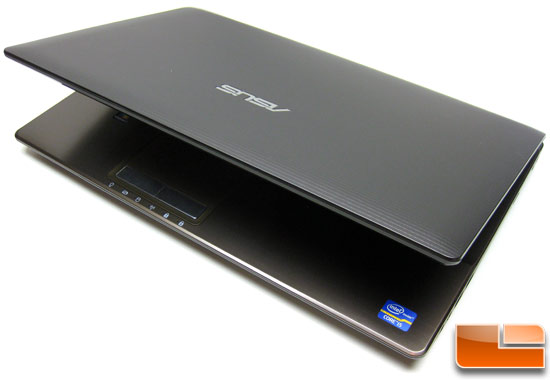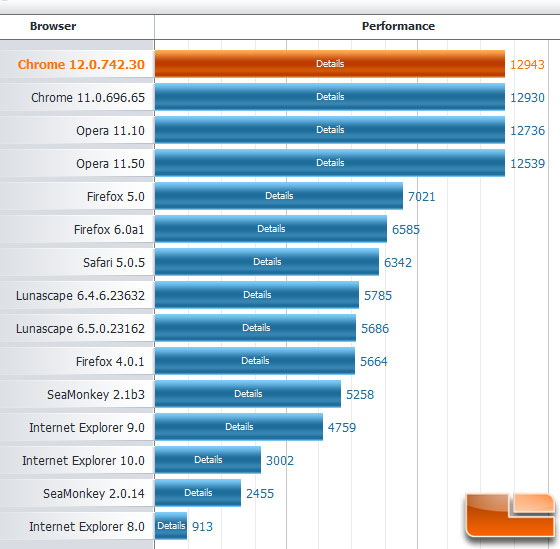What Web Browser is Fastest for Windows in 2011?
Benchmarking JavaScript, Flash and HTML 5 Performance on Internet Browsers
For the past two years we have taken the time to stop doing hardware and do give web browsers a chance at the spotlight. This year is no exception and we will be taking our most in-depth look at web browsers ever. Back in 2009 when we started doing performance testing on web browsers we ran the Peacekeeper benchmark and called it a day. The next year we didn’t feel like that was enough, so we tested even more browsers and also included SunSpider Javascript benchmark results. This year we wanted to trump what we did the year before, so we have taken the time to run seven tests on 15 different browsers. We wanted this article to be your ‘one stop shop’ to help you determine what web browser is fastest and best suites your needs.
Web Browser Benchmarks and/or Feature Tests Used:
- Futuremark Peacekeeper Browser Benchmark
- V8 Benchmark Suite – version 6 Benchmark
- Sunspider 0.9.1 JavaScript Benchmark (1 interation)
- Google Modified Sunspider 0.9.1 JavaScript Benchmark (50 iterations)
- Microsoft Fish Tank w/ 1000 fish
- HTML5 Test
- Acid 3 Test

Before we show you the benchmarks results, let’s take a
look at the ASUS K53E test system (review) that all the testing was done on. The
ASUS K42F notebook uses the second generation Intel Core i5-2520M processor, 2x4GB DDR3
1866MHz Kingston HyperX Plug and Play memory modules (review) and an Intel 510 Series 250GB SSD (review). This is an Intel Sandy Bridge laptop that just came out this year and has been updated with the fastest hardware, so it
is current and should be more than up for the task of browser
benchmarking. Adobe Flash 10.2.159.1 was also installed on the laptop. Let’s take a look at the 14 browsers that we downloaded to
compared to each other.
The 15 Browsers Benchmarked:
- Firefox 5.0 Beta 1
- Firefox 6.0 Alpha 1
- Internet
Explorer 10.0 Preview 1 - Lunascape 6.4.6
- Lunascape 6.5.0 Beta 2
Let’s take a look and see how these web browsers perform!
Futuremark PeaceKeeper
To create the tests used in Peacemaker Futuremark used a profiler to analyze JavaScript
usage while browsing popular websites such as YouTube, Facebook, GMail and Meebo. The profiler collected data on
the frequency in which different JavaScript functions were called on
these sites and Futuremark used this data to create specific weighted
tests for each function. The end result is a benchmark and shows ‘true’
JavaScript performance on browsers that can be run on any operating
system and platform as long as it can run JavaScript. This test also

Using a resolution of 1366×768 and no other
applications open, we fired up the Peacemaker benchmark to see
which was the fastest internet browser (higher numbers mean better
performance). After the dust settled Google’s Chrome 11.0 and Chrome 12.0 Beta were both in
the lead and Internet Explorer 8.0 was in dead last. Last year this benchmark showed Google Chrome 6 was the fastest and Microsoft’s Internet Explorer 7.0 was the slowest, so the fastest and slowest browsers just changes versions. Firefox 5.0 Beta and FireFox 6.0 Alpha 1 both showed performance improvements over Firefox 4.0.1, which is a great sign for FireFox fans. Opera 11.10 and 11.50 Alpha were looking strong and were shown to be faster than Firefox and just a hair behind Chrome. One of the biggest shocks of this benchmark had to be the Lunascape browser benchmarks that we ran. Lunascape has what they call ‘triple engines,’ so you can pick between IE, Firefox and Gecko. We installed both Lunascape versions and ran the default web browser settings which is IE. If you look at the chart above you can see that Lunascape browser performs better than IE 8, 9 and 10 though.

Comments are closed.